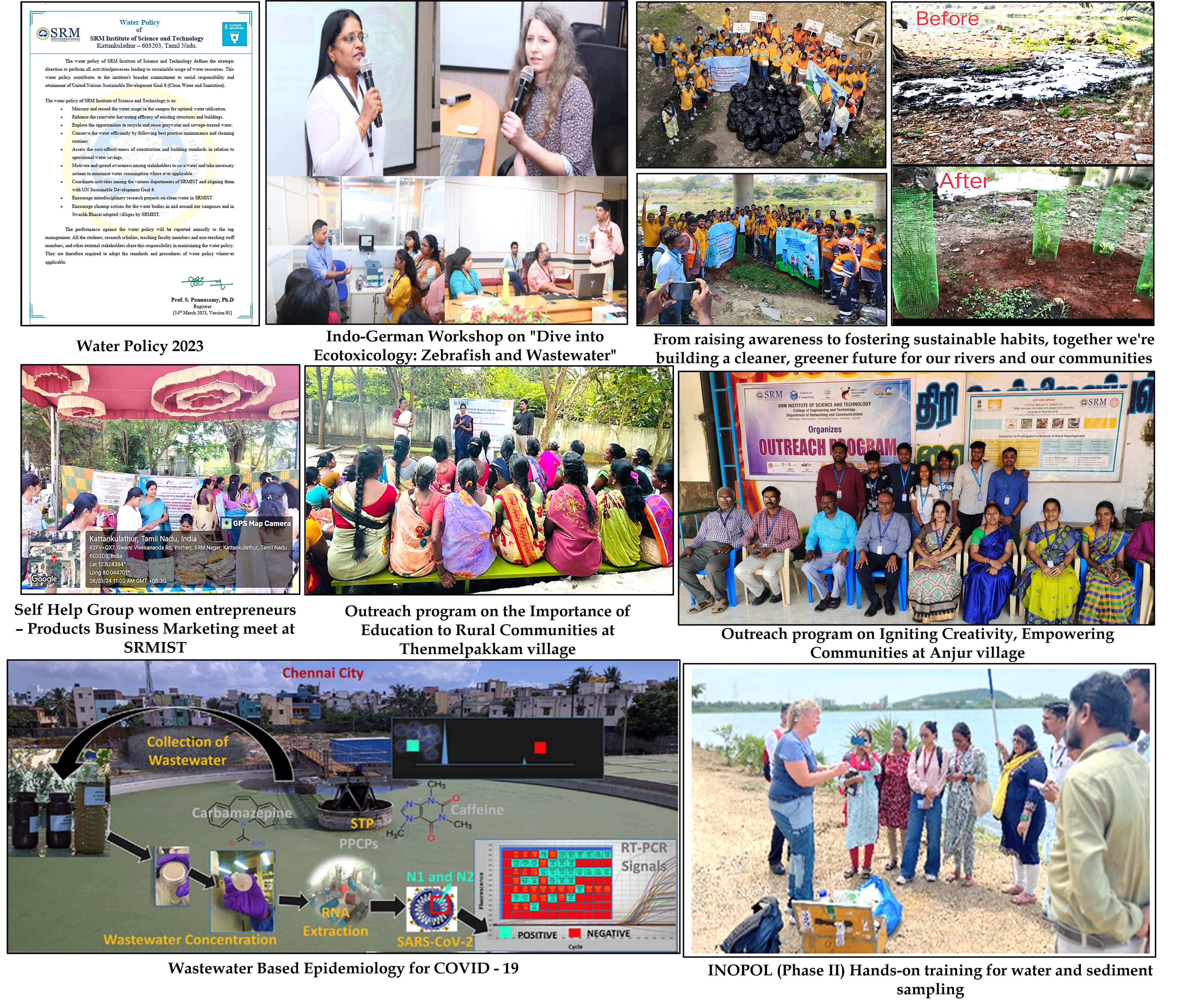Progress report for
Sustainable technology development and research initiatives to mitigate environmental challenges: Moving towards a climate-resilient future

Achievement at a glance
Policy Framework:The Water Policy 2023 of SRMIST was launched by Prof. S. Ponnusamy, Registrar, SRMIST on 22.03.2023.
Remediate, Recycle, and Reuse Wastewater:
At SRMIST, the primary groundwater extraction sources are open wells and borewells. The per capita consumption of groundwater for the year 2022-23 was 87.4 litres and 2023-24 was 71.9 litres. The per capita consumption of groundwater for the year 2023-24 was 18% lower than 2022-23.
The per capita generation of wastewater for the year 2022-23 was 70 liters and for 2023-24 was 57.50 liters. The wastewater generated for 2023-24 was 18% reduced compared to 2022-23. This may be due to the increased awareness among the stakeholders to optimally utilize the water.
All the wastewater generated on the campus was treated at the Sewage Treatment Plants and utilized within the campus premises. The treated wastewater was utilized for watering the horticulture, and gardening activities. In addition, it was used to recharge the groundwater through harvesting beds of area 5,157 sq. ft.
Augmenting Renewable Energy:
In the present scenario, the total capacity of 865 kWp solar panels is functional. The total electricity generated during 2023-24 is 4% greater than in 2022-23 due to the regular maintenance of the solar panels.
Capacity Building:
The outreach program conducted by REACH, Directorate of Research, SRM IST on the International Day of Action for Rivers and World Water Day 2024 on 14.03.2024 aimed to raise awareness about the importance of rivers, particularly the Adyar river in Saidapet, Chennai.
Self Help Group Women Entrepreneurs Meet – Products Business Marketing at SRMIST on 8th & 9th March 2024 to create a platform for rural women entrepreneurs to come together, share their experiences, and discuss challenges and opportunities in their businesses.
The Inauguration of a Self-Sustainable Milk Processing Enterprise for Women's Self-Help Group at Nattarasanpattu Village on 02.11.2023 with a focus on SDG 1 as a part of the 2nd International Conference on Sustainable Development Goals (ICSDG 2023).
Projects:
1. Monitoring of community wastewater for early signalling the spread of COVID-19 in
Chennai city.
2. Genome sequencing and Wastewater surveillance in open drains of Chennai City and the suburbs for predicting the future waves of COVID-19 pandemic.
3. Design and development of sensor for detection of pharmaceutical compounds present in water and Wastewater.
4. Multi-city initiative for ES for SARS-Cov-2 under the Precision Health program for Kochi/Ernakulam city.
Research:
1. https://www.sciencedirect.com/science/article/pii/S0048969721013206?via%3Dihub
2. https://www.sciencedirect.com/science/article/abs/pii/S0048969722052949
REACH Centre Links:
1. https://www.youtube.com/@reachsrmist/featured
2. https://www.linkedin.com/in/srmist-reach-596400267/
3. https://drive.google.com/file/d/1LTUX1KW53UgP1ArpBTBcK0kO8uHEWOnY/view?usp=drivesdk
4. https://drive.google.com/file/d/1mjjp5H08cdEsw3le3mOY9GtMQ6yUC833/view?usp=drivesdk
Next Steps
1. Further Reduce Water ConsumptionInvestigate opportunities for installing low-flow faucets and showerheads in hostels and academic buildings.
Promote rainwater harvesting by expanding collection and storage capabilities.
Conduct water use audits in departments to identify and address areas of high consumption.
2. Enhance Wastewater Treatment and Reuse
Investigate the feasibility of using treated wastewater for flushing toilets or other non-potable applications.
Increase the utilization of treated wastewater for on-campus irrigation by expanding the gardening and landscaping areas.
3. Expand Renewable Energy Generation
To significantly increase the electricity production using renewable energy, 2 MW rooftop solar panel project is in due for implementation at the DCA and E&T Hostel campuses, which is expected to generate 2,40,000 kWh units/month of electricity.
4. Continue Outreach and Capacity Building
Organizing workshops, training, and seminars on water conservation practices for students, faculty, and staff members.
Collaborate with NGOs and government agencies to promote sustainable water management practices in the Swachh Bharat adopted villages.
Beneficiaries
Students, teaching staff, industries, government, international agencies, academia, NGOs and society at large.
Actions
Reduced water consumption:The water policy has led to an 18% decrease in per capita water consumption, potentially lowering water bills and ensuring a more sustainable water supply for campus needs.
Wastewater treatment and reuse:
All wastewater generated within the campus was treated and used for irrigation and groundwater recharge, reducing freshwater usage for these purposes.
Water conservation awareness:
Outreach programs on International Day of Action for Rivers educate the local community about water resource management.
Sustainable practices:
SRMIST's water conservation efforts contribute to national and international goals for sustainable water management practices.
The milk processing enterprise for women entrepreneurs aligns with UN Sustainable Development Goal 1 (poverty reduction) efforts.
Knowledge sharing:
Outreach programs like the "Importance of Education" program can inspire collaboration between SRMIST and NGOs for community development initiatives.
Overall, SRMIST's commitment to water conservation and sustainability benefits a wide range of stakeholders within and beyond the university campus.
